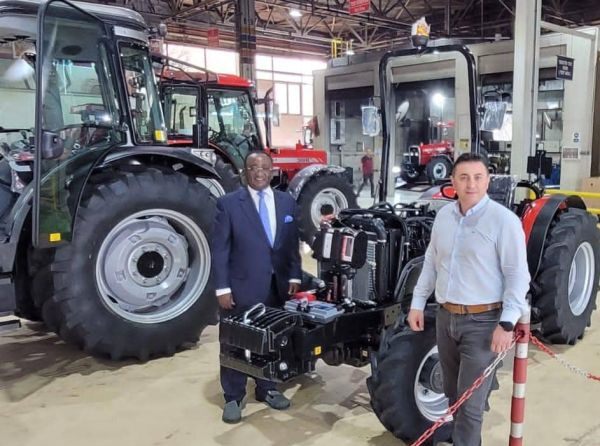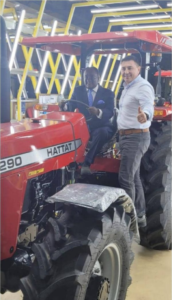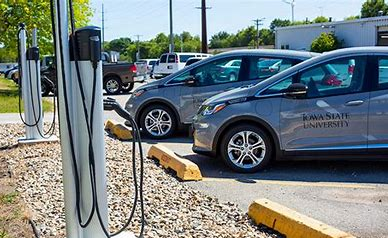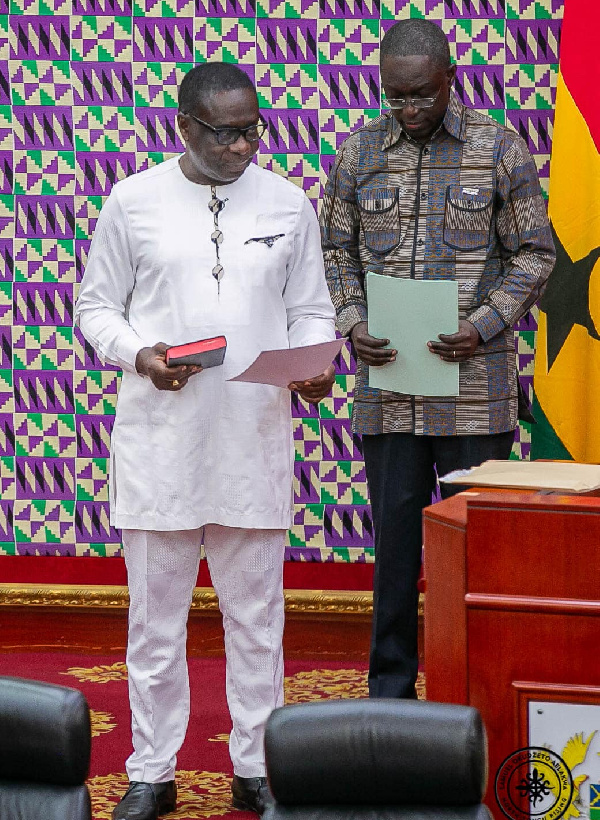In a significant development for Ghana’s agricultural sector, Dr. Owusu Afriyie Akoto, a flagbearer hopeful of the New Patriotic Party (NPP) and the country’s former Minister of Food and Agriculture, has successfully secured a tractor manufacturing plant deal. This deal is set to revolutionize mechanized farming and foster agricultural growth not only in Ghana but also in other countries within the West African sub-region. During his recent visit to Turkey, Dr. Akoto engaged in extensive discussions with the directors of Hattat Traktör, culminating in this landmark agreement.
Ghana’s Agriculture Minister: A Champion of Growth
Dr. Owusu Afriyie Akoto’s unwavering commitment to Ghana’s agricultural development has made him a prominent figure in the country’s political landscape. Serving as the Minister of Food and Agriculture, he implemented numerous policies aimed at transforming the agricultural sector and enhancing food security. Now, as a flagbearer hopeful of the NPP, his vision extends further to revolutionizing mechanized farming in Ghana and the wider West African sub-region.
Hattat Traktör: A Leader in Tractor Manufacturing
Hattat Traktör, founded in 1998, has established itself as a prominent manufacturer of high-quality tractors. Their tractor models range from 50 to 113 horsepower, equipped with advanced technology, and designed for various agricultural needs such as ergonomic gardens, compact farming, and large fields. The company’s commitment to innovation and fuel efficiency has earned them several accolades over the years. Hattat Traktör was awarded “Tractor of the Year” and “Cab Design Officer of the Year” in Poland in 2010. They were also recognized as the plow champion in Ireland in 2011, Latvia in 2013, and received a Silver Medal in the Moldova Moldagrotech Fair in 2014. In 2016, their new T4000 series was named “Tractor of the Year” in Poland. Dr. Akoto’s proactive efforts in initiating discussions with Hattat Traktör highlight the significance he places on the agricultural sector and the potential impact of the company’s investment.

Striking the Tractor Manufacturing Plant Deal
The tractor manufacturing plant deal secured by Dr. Akoto is poised to have a transformative impact on Ghana’s agricultural landscape. The discussions between Dr. Akoto and the directors of Hattat Traktör centered on fostering an enabling environment for the business to thrive. Policy formulation was a key focus, with the aim of protecting and supporting the tractor manufacturing plant, as well as addressing issues of accessibility and affordability.
Ghana’s Agricultural Sector and the Need for Mechanization
Ghana, a West African nation, boasts a substantial agricultural industry with approximately 3.1 million professional farmers. However, the majority of farmers in Ghana are smallholders, and only a few engage in mechanized farming practices. The Institute of Statistical, Social, and Economic Research (ISSER) reported in their 2021 edition of the ‘State of Ghanaian Economy Report’ that Ghana’s agricultural sector experienced a remarkable growth rate of 8.4% in 2021, the highest recorded in the country’s fourth republic. To fully harness the potential of Ghana’s agricultural sector, Dr. Akoto, drawing on his 18 years of experience in the UN systems, advocates for increased public funding and a special focus on mechanized farming. The Hindawi Advances in Agriculture Journal published a study titled ‘Status of Agricultural Mechanization in Ghana: Insight from farmers’ perception, population, and nonagricultural sector growth,’ which revealed the low level of agricultural mechanization in the country. The study found that approximately 77.6% of farm operations in Ghana are still performed manually, with less than 20% being mechanized in 2020.
Exploring the Showroom of Hattat Traktör
Following the fruitful discussions, Dr. Akoto had the opportunity to visit the showroom of Hattat Traktör in Turkey. The showroom showcased a wide range of tractors that are poised to contribute significantly to mechanized farming in Ghana and the West African sub-region. This visit allowed Dr. Akoto to witness firsthand the cutting-edge technology and machinery that will soon be available to enhance agricultural productivity.

The Role of Tractor Power Availability in Ghana
The availability of tractor power is a crucial factor in advancing agricultural mechanization in Ghana. The aforementioned study on the status of agricultural mechanization in Ghana shed light on the key determinants of tractor power availability. It highlighted the impact of the population size and the number of people employed in the.
The Impact on Ghana’s Agricultural Sector
The tractor manufacturing plant deal struck by Dr. Akoto is expected to propel agricultural development in Ghana. By boosting mechanized farming, the country can overcome many of the challenges associated with manual labor and outdated agricultural practices. With improved access to modern tractors, farmers will be able to increase productivity, reduce post-harvest losses, and enhance overall efficiency. This, in turn, will contribute to food security, economic growth, and poverty alleviation.
Benefits for the West African Sub-Region
The positive effects of this major tractor agreement are not limited to Ghana alone. The neighboring countries within the West African sub-region are also set to benefit from this groundbreaking deal. The increased availability and affordability of tractors will create a ripple effect, promoting mechanization and agricultural advancement throughout the region. By sharing technological advancements and best practices, countries can collectively work toward sustainable agricultural development and economic prosperity.
Frequently Asked Questions (FAQs)
Q1: How will the tractor manufacturing plant deal benefit Ghana?
The tractor manufacturing plant deal secured by Dr. Owusu Afriyie Akoto will boost mechanized farming in Ghana, leading to increased agricultural productivity, improved food security, and economic growth. It will enable farmers to overcome manual labor limitations and outdated practices, enhancing efficiency and reducing post-harvest losses.
Q2: Will other countries in the West African sub-region also benefit from this deal?
Absolutely. The tractor manufacturing plant deal struck by Dr. Akoto is expected to have a positive impact beyond Ghana’s borders. The neighboring countries within the West African sub-region will benefit from increased access to modern tractors, fostering mechanization, and propelling agricultural development in the entire region.
Q3: How will mechanized farming improve agricultural productivity?
Mechanized farming offers several advantages, such as increased efficiency, reduced labor requirements, and enhanced precision. Modern tractors can perform a variety of tasks, including plowing, planting, and harvesting, more quickly and accurately than manual labor. This results in higher yields, improved quality control, and overall increased agricultural productivity.
Q4: What are the implications of this deal for food security in Ghana?
By promoting mechanized farming, the tractor manufacturing plant deal contributes to improved food security in Ghana. With increased agricultural productivity and reduced post-harvest losses, the country can ensure a steady and reliable food supply for its population. This is a crucial step toward combating hunger and malnutrition.
Q5: How does this agreement align with Dr. Akoto’s vision for agricultural development?
Dr. Owusu Afriyie Akoto has long been an advocate for agricultural transformation in Ghana. This tractor manufacturing plant deal aligns perfectly with his vision of embracing modern technologies and mechanization to revolutionize the sector. By securing this agreement, Dr. Akoto is taking concrete steps toward achieving his goal of propelling agricultural development and improving the livelihoods of farmers.
Q6: What are the next steps following the tractor manufacturing plant deal?
With the tractor manufacturing plant deal successfully secured, the next steps involve the implementation and deployment of the machinery. This will require collaboration between the stakeholders involved, including the government, Hattat Traktör, and agricultural organizations. Training programs and support systems will be put in place to ensure farmers can effectively utilize the tractors to maximize their benefits.
Conclusion
Ghana’s Agriculture Minister, Afriyie Akoto, has achieved a significant milestone with the tractor manufacturing plant deal he secured for the country. This landmark agreement propels Ghana’s agricultural development and sets the stage for enhanced mechanized farming and increased agricultural productivity. Furthermore, the deal is expected to benefit other countries in the West African sub-region, fostering regional collaboration and sustainable agricultural growth. Through this agreement, Dr. Akoto showcases his dedication to the sector and his determination to drive positive change in Ghana’s agricultural landscape.














